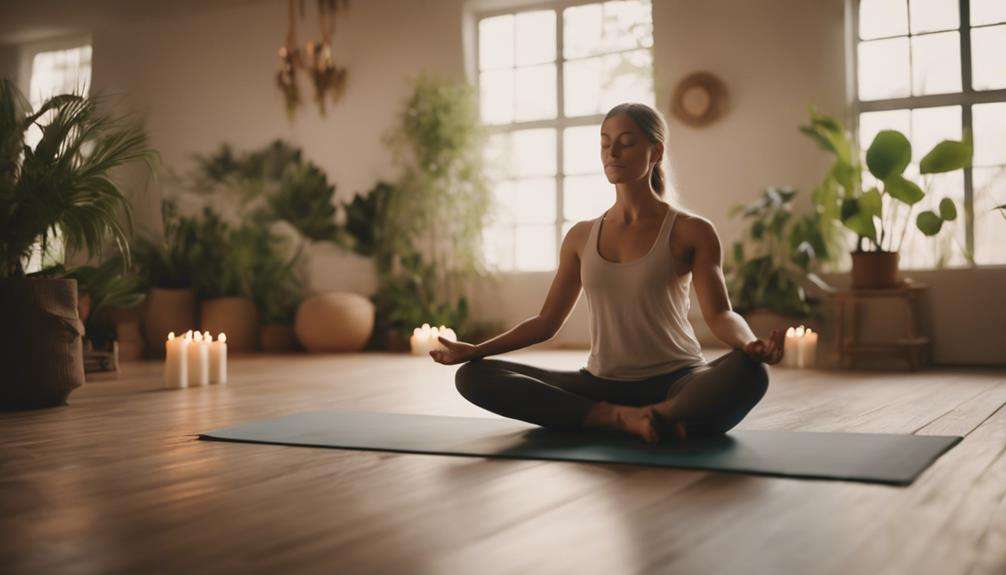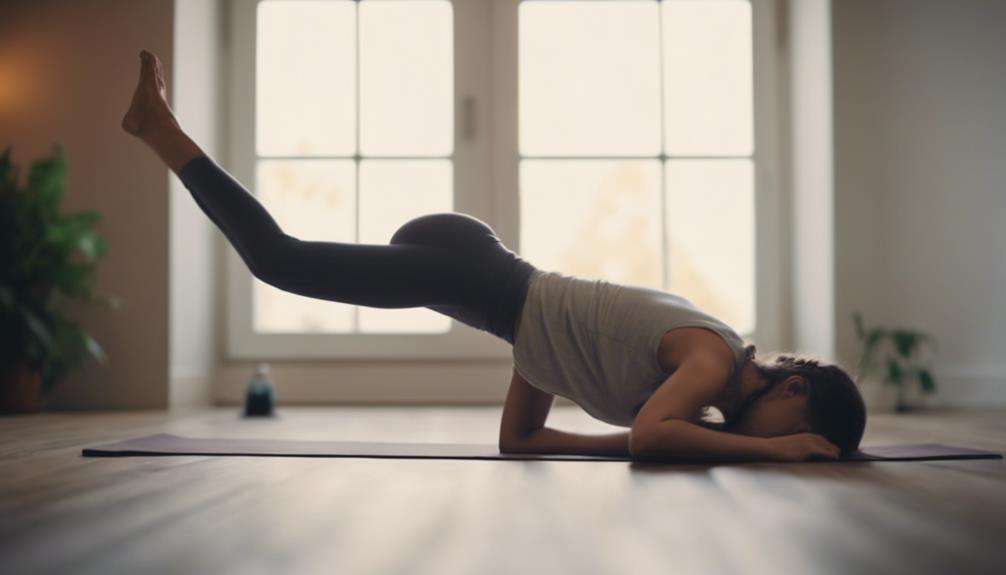When you roll out your yoga mat after a long, stressful day, you may wonder how this ancient practice can truly help alleviate your tension.
The physical postures, breathing exercises, and mindfulness techniques in yoga all work together to create a powerful stress-reduction tool.
But have you ever thought about the science behind how yoga influences your body's stress response?
Let's explore how yoga's holistic approach can transform your relationship with stress and enhance your overall well-being.
Key Takeaways
- Yoga effectively reduces stress and anxiety levels through physical postures and meditation.
- Regular practice enhances resilience against stressors and promotes inner peace.
- Breathwork and mindfulness in yoga aid in managing stress levels for improved mental clarity.
- Yoga promotes relaxation, reduces cortisol levels, and calms the nervous system for better stress management.
The Science Behind Yoga's Stress-Relief
Discover how the scientific evidence supports yoga's effectiveness in reducing stress and promoting mental well-being.
Yoga is a powerful tool when it comes to stress reduction. Scientific studies have consistently shown that engaging in yoga practices can significantly reduce stress and anxiety levels. The combination of physical postures, breathing techniques, and meditation in yoga helps to calm the mind and relax the body, making it an effective way to alleviate stress.
By incorporating yoga into your routine, you can learn to manage your body's stress response, leading to a more balanced and peaceful state of mind. The mindfulness aspect of yoga allows you to focus on the present moment, letting go of worries and fears that often contribute to feelings of stress.
Through regular practice, you can develop resilience against stressors and cultivate a sense of inner peace and well-being. Embracing yoga as a holistic approach to stress reduction can have a profound impact on your mental health and overall quality of life.
Physical Benefits of Yoga for Stress
Yoga's physical benefits play a key role in effectively reducing stress by targeting tension areas, enhancing relaxation, and promoting overall well-being. Regular practice of yoga not only helps in releasing endorphins that elevate mood but also aids in promoting relaxation, which is essential for combating stress.
By focusing on tension areas like the hips and shoulders, yoga helps reduce physical stress, allowing the body to unwind and release built-up tension. Incorporating Progressive Muscle Relaxation techniques further aids in releasing body tension, contributing to stress relief.
Additionally, Hatha Yoga postures are adaptable to various fitness levels, offering a wide range of physical benefits that can contribute significantly to stress reduction. Moreover, the incorporation of breath work, such as Pranayama, in yoga practice enhances relaxation both on and off the mat, providing a powerful tool for effectively combating stress.
Embracing these physical aspects of yoga can lead to a more relaxed and balanced state, contributing to overall well-being and stress reduction.
Mental Clarity Through Yoga Practice
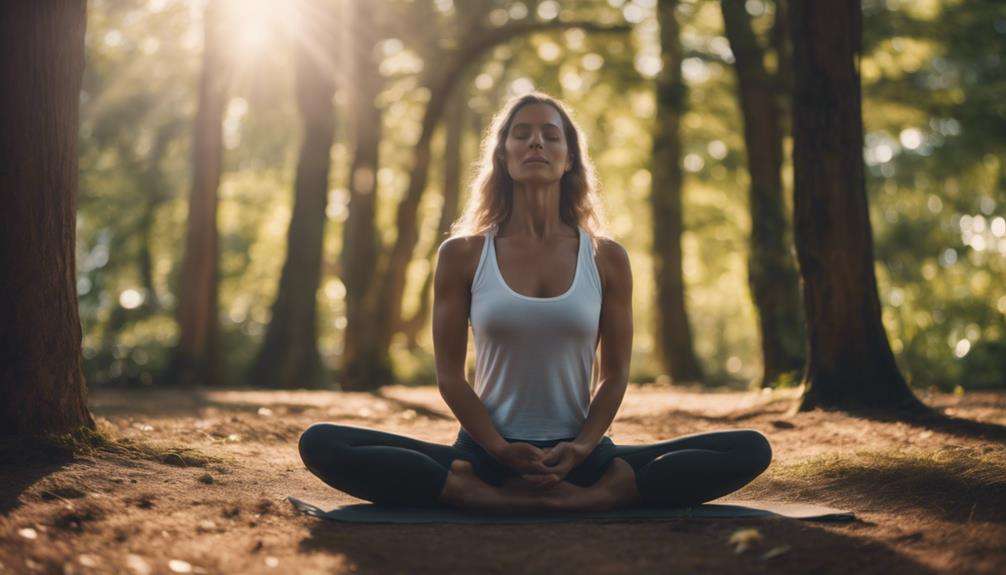
Enhancing mental clarity through regular yoga practice involves focusing on breath and body movements to promote relaxation and clear the mind. By incorporating breathing exercises and mindfulness techniques, yoga helps individuals cultivate mental clarity and improve cognitive function.
Here are some key ways yoga enhances mental clarity:
- Breathing Exercises: Practicing deep breathing techniques in yoga helps calm the mind and reduce stress, leading to improved focus and mental clarity.
- Focus: Yoga encourages practitioners to concentrate on the present moment, allowing them to let go of distractions and enhance their mental clarity.
- Mindfulness: By being fully present in their body and breath during yoga practice, individuals can clear their minds of clutter and achieve mental clarity.
- Stress Reduction: Through yoga, individuals learn to manage stress levels effectively, leading to a clearer mind and improved cognitive performance.
Engaging in yoga regularly can provide a profound sense of mental clarity, allowing individuals to navigate daily challenges with a focused and tranquil mind.
Yoga Poses for Relaxation
Exploring yoga poses for relaxation can offer a rejuvenating and calming experience for both the body and mind. Child's Pose, known for promoting inward focus, restoring energy, and aiding in stress relief, can be a great starting point.
By practicing Legs-Up-the-Wall Pose, you can enhance lymph flow, circulation, and achieve deep relaxation, which is essential for reducing stress levels.
Corpse Pose, focusing on deep breathing, calming the mind, and releasing tension, is a powerful way to alleviate stress and promote overall well-being.
These poses, along with others like Cat-Cow Pose, facilitate the connection between breath and movement, calming the mind, and reducing stress effectively.
Breathwork Techniques in Yoga
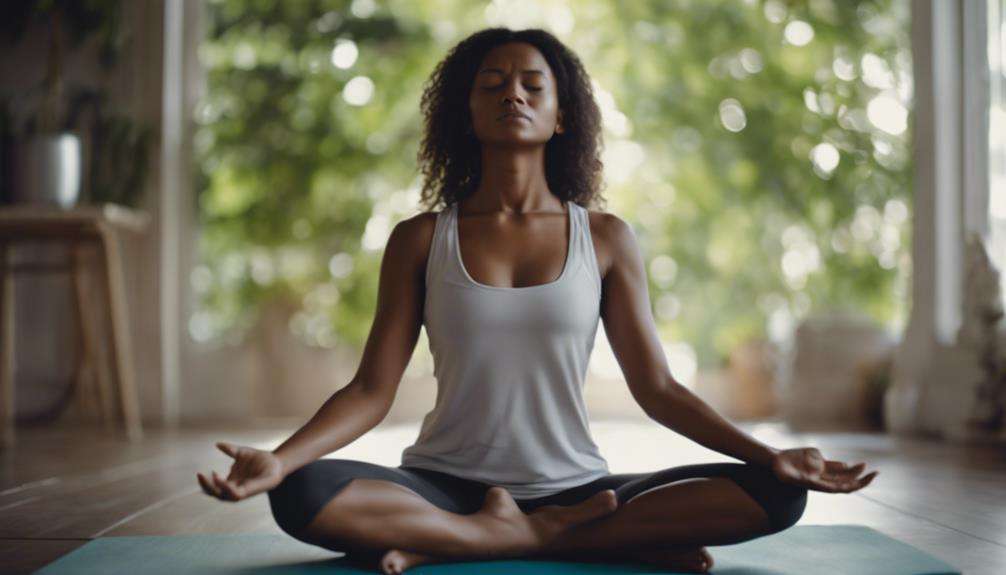
When exploring breathwork techniques in yoga, you'll discover their profound benefits for deep relaxation and the mind-body connection.
These techniques not only regulate your breath but also encourage a sense of mindfulness through focused breathing practices.
As you delve into pranayama practices like alternate nostril breathing and breath of fire, you'll experience how they can effectively reduce stress and anxiety.
Deep Breathing Benefits
Incorporating deep breathing techniques in yoga can significantly enhance your ability to manage stress and promote relaxation. Deep breathing exercises, also known as pranayama, play a crucial role in stress reduction.
Here are some benefits of deep breathing in yoga:
- Pranayama in yoga promotes relaxation, regulates breath, and encourages deep breathing.
- Deep breathing exercises effectively reduce stress, calm the body and mind, and enhance sleep quality.
- Popular pranayama techniques like alternate nostril breathing and breath of fire aid in stress relief.
- Breathing exercises are valuable tools during emotional or high-stress situations.
Mind-Body Connection
Deep breathing techniques in yoga, particularly pranayama, establish a profound connection between the mind and body, fostering relaxation and stress relief. By focusing on intentional breathing patterns, you can effectively calm your nervous system, reduce anxiety, and enhance your overall sense of well-being.
These relaxation techniques not only benefit you during your yoga practice but also equip you to navigate stressful situations with a greater sense of ease in your daily life. Through breathwork, you cultivate a deeper awareness of your body and mind, promoting mindfulness and inner peace.
Embracing breathwork as an integral part of your yoga routine empowers you to harness the power of your breath for relaxation and stress relief both on and off the mat.
Mindfulness and Meditation in Yoga
Mindfulness and meditation play essential roles in yoga by fostering a present-moment focus without judgment, which effectively reduces stress and anxiety levels. When you practice mindfulness in yoga, you learn to concentrate on the here and now, letting go of worries about the past or future. This can help alleviate stress by grounding you in the present moment.
Additionally, incorporating meditation into your yoga routine can promote deep relaxation, enhance mental clarity, and lower cortisol levels, the stress hormone. Here are some key benefits of mindfulness and meditation in yoga:
- Mindfulness cultivates a non-judgmental awareness of your thoughts and feelings.
- Meditation aids in achieving a state of mental calmness and relaxation.
- Yoga nidra, a form of meditation, induces conscious relaxation for stress relief.
- Regular mindfulness and meditation practice can improve emotional well-being and self-awareness.
Incorporating Yoga Into Daily Routine
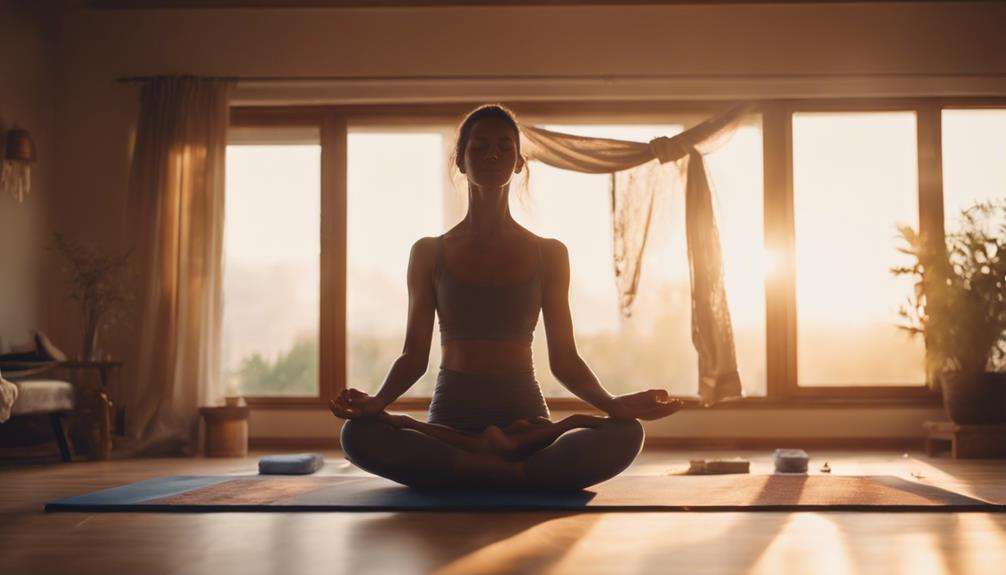
When adding yoga practices to your daily routine, you can effectively manage stress levels and enhance overall well-being.
Including mini-yoga sessions throughout the day is a simple yet powerful way to keep stress at bay.
Before facing stressful events such as exams, practicing specific yoga poses can help calm your mind and center your thoughts, preparing you to tackle challenges with a clear mindset.
Moreover, incorporating yoga stretches into your study breaks can relax tense areas of your body, promoting physical well-being alongside mental relaxation.
As part of your bedtime routine, engaging in gentle yoga stretches can signal to your body that it's time to unwind, leading to better sleep quality.
Personalizing Your Yoga Practice
Personalizing your yoga practice involves tailoring it to meet your individual needs and goals, ensuring a customized approach to stress reduction and overall well-being. When personalizing your yoga practice, consider the following:
- Flexibility in Practice Frequency: There are no strict guidelines for how often you should practice, allowing you to adjust based on your schedule and preferences.
- Benefits of Consistency: The more you practice yoga consistently, the greater stress reduction and overall well-being benefits you're likely to experience.
- Consider Your Fitness Level: Your initial fitness level and health status should guide the intensity and duration of your personalized yoga practice.
- Start Strong: Consistent and personalized practice, especially in the beginning, is recommended to fully embrace and benefit from the stress-reducing aspects of yoga.
Frequently Asked Questions
How Does Yoga Help to Reduce Stress?
Incorporating yoga into your routine supports stress reduction by interconnecting mind and body. Through breathing techniques and physical relaxation, you achieve mental clarity, emotional balance, and effective stress management. Embrace yoga for holistic well-being.
What Are the Positive Effects of Yoga on Stress?
In the realm of stress reduction, yoga serves as your calming oasis amidst life's chaos. It harmonizes your mind-body connection, triggers a relaxation response, and tames cortisol levels. Embrace yoga's power to unwind.
What Is Yoga Therapy for Stress?
Yoga therapy for stress combines mind-body connection, relaxation techniques, breathing exercises, and mindfulness practices. It offers self-care strategies for holistic healing, tailored to address individual stressors and promote emotional balance. Embrace yoga therapy to reduce stress effectively.
What Type of Yoga Is Best for Stress Relief?
For stress relief, try restorative yoga for deep relaxation. Vinyasa flow promotes mindfulness through breath. Yin yoga releases tension in connective tissues. Each type offers unique benefits. Experiment to find what resonates best for you.
Conclusion
As you continue to embrace yoga in your daily routine, you'll unlock the true power of stress reduction and find peace within yourself.
With each breath, each pose, and each moment of mindfulness, you're cultivating a sense of balance and harmony that will guide you through life's challenges.
Trust in the practice, trust in yourself, and let yoga be your companion on this journey towards a calmer, more resilient you.
Embrace the transformation that awaits.

